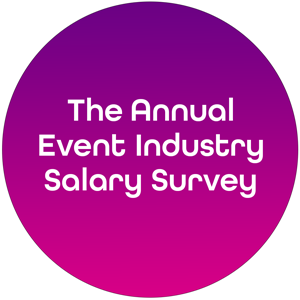Are we really ready for a seismic shift in how we work?
As I look back on the last Events Industry Salary Survey where over 1300 people responded, it’s clear that the workplace is on the brink of transformation. We’re not just talking about minor adjustments but fundamental changes that could redefine our professional lives. The survey revealed some pressing trends and predictions; the growing demand for a four-day workweek, the ‘new normal’ of hybrid working, and the evolving benefits landscape.
The Four-Day Workweek: A Growing Demand
One trend that’s impossible to ignore is the desire for a four-day workweek. According to the survey, this benefit topped the wish list, with 55% of respondents eager to see it implemented. This isn’t just idle chatter; it represents a significant shift in how we perceive work-life balance.
A true four-day workweek means working four days while receiving a full-time salary—not squeezing five days of work into four (this is condensed hours), or accepting a pay cut. It’s a call for genuine change. But how realistic is this in our industry? In the survey white paper, Laura Capell-Abra from Stress Matters points out the challenge of finding 20% efficiencies in event teams already stretched thin. Yet, the potential benefits for mental health and work-life balance make this a trend worth pursuing. It’s not about cramming more work into fewer days; it’s about rethinking how we work entirely.
Hybrid Working: The New Normal
Hybrid working (set days in the office and WFH) isn’t just a trend; it’s become the new norm. Our survey data revealed that 56% of respondents are now on a hybrid model, and a whopping 74% would seek hybrid roles in future job searches. This blend of working from wherever, combined with some office presence offers flexibility while maintaining essential face-to-face interactions. Remote first (never going into the office) is now only a small part of the industry, flexible is the model we should be striving for, no fixed office or WFH days but more of a project-based approach where the employee manages their own time.
But let’s not forget the ethos our industry is built on; personal connections and in-person collaboration are irreplaceable. While hybrid working supports flexibility, it can be a challenge to maintain team collaboration and creativity. The spontaneous interactions that spark innovation are harder to achieve remotely. Businesses must find ways to nurture these connections in a hybrid environment.
Catherine Turner , CEO & Founder, CTL Communications is concerned about how we build a tribe with a sense of belonging, respecting personal choices and nurturing personal development and business processes in these new ways of working. She agrees that we are at the infancy of this challenge and thinks that it’s time for us all to figure out better ways, saying that there will be many different ways of working and we should find ways to make them all work well.
Evolving Benefits Landscape
The benefits landscape is evolving, reflecting the changing priorities of our workforce. Beyond the four-day workweek, there’s a growing demand for comprehensive health benefits, flexible working arrangements, and mental health support. Our survey highlights that health insurance, gym memberships, and wellness programs are increasingly desirable.
Fiona Lawlor from Jack Morton London illustrates this shift well. Their benefit program now emphasises flexibility and employee well-being, introducing perks like no-meeting Fridays, wellness workshops, and hybrid working options. This holistic approach to benefits is crucial in attracting and retaining talent in our competitive job market.
Work-Life Balance: More Than Just a Buzzword
Achieving a healthy work-life balance is more than a trendy phrase—it’s a necessity. Interestingly, our survey found that nearly a third of respondents seek hybrid working to improve their work-life balance. However, financial stability remains a top priority, with many employees desiring higher salaries to ensure their well-being.
It’s important to recognise that money alone doesn’t guarantee happiness. Employers need to create environments where employees feel supported and valued beyond financial compensation. Social events, recognition programs, and genuine care for personal and professional development play critical roles in creating a positive work culture.
Looking Ahead
As we come into the second half of 2024, the workplace will continue to evolve in response to these trends and demands. The push for a four-day workweek, the normalisation of hybrid working, and the emphasis on comprehensive benefits signal a broader shift towards more flexible, employee-centric working environments.
Forward thinking employers who adapt to these changes and prioritise the well-being of their teams will be better positioned to thrive and retain existing talent. We need to stop focusing solely on output – no one joined our industry to be another brick in the wall. It’s time to embrace the future of work with a fresh perspective, ensuring that both businesses and employees can flourish.
The events industry workplace is on the cusp of a revolution. The trends I’ve highlighted here—four-day workweeks, hybrid models, and evolving benefits—are not just passing fads. They reflect a deeper, more meaningful shift in how we approach work. As we navigate this landscape, let’s keep our focus on what truly matters: creating a work environment where everyone can thrive.
To download the full Events Industry Salary Survey White paper please click HERE
…………………………………………………………………………………………………………………
About the author.
I’m Robert Kenward, Chief Talent Officer and creator of FitabilityⓇ.
I’ve been working in the recruitment, Live Events, Brand Experience, and Experiential Marketing space for over two decades. I’ve been a candidate, a client, and a recruiter.
This makes me well acquainted with the challenges you face and enables me to cover the entire talent spectrum above £60k.
I care deeply about my work and I’m generous with my time.
Get in touch if you’d like a new perspective on solving classic hiring problems.
07710 681980
Or book directly into my diary HERE to see how I can help you attract, select and retain your next senior hire.






